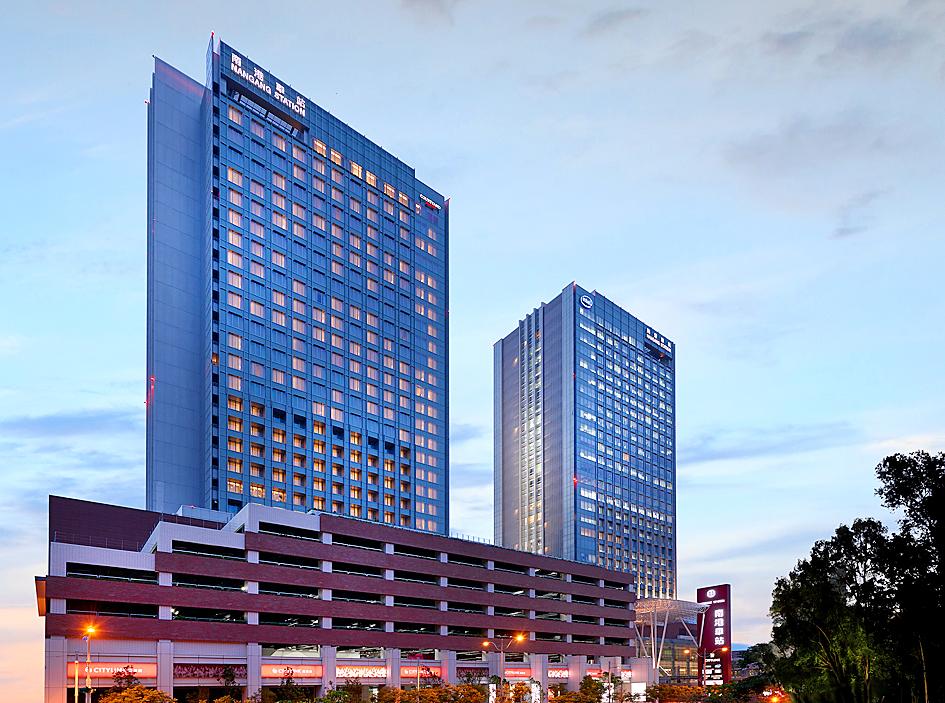Courtyard by Marriott Taipei (六福萬怡) in Taipei’s Nangang District (南港) is to suspend its operations next month as it mulls converting into a quarantine hotel, exhibition venue or offices to better utilize its space and increase revenue.
“The macro-environment is unfavorable for the hospitality industry and warrants a reassessment of space utilization to boost revenue,” the five-star hotel said.
The hotel in the same complex as the Nangang MRT and high-speed rail stations, as well as a shopping mall, was looking to attract domestic and foreign travelers doing business at the Taipei Nangang Exhibition Center, but that aim has been foiled by the COVID-19 pandemic.

Photo courtesy of Courtyard by Marriott Taipei
Options under consideration include turning it into a quarantine hotel, an exhibition venue or office space, the hotel said.
Occupancy rates for hotels in Taipei are in single-digit percentages, tourism bureau data showed, after the government advised people to avoid large gatherings even after the nationwide COVID-19 alert was lowered from level 3 to level 2 in July.
Disease prevention measures have hit large hotels hard as they depend heavily on tourists, analysts say.
The hotel with 465 guestrooms is the flagship property of Leofoo Tourism Group (六福旅遊集團), which also owns Leofoo Hotel (六福客棧), and operates the Leofoo Village Theme Park (六福村) and the Leofoo Resort (六福莊) in Hsinchu County.
The group posted a net loss of NT$360 million (US$12.98 million) in the first six months of this year, or losses per share of NT$1.92.
The theme park is offering a discounted NT$3,996 ticket for four visitors, who then enter a draw to win a free night at the Courtyard by Marriot Taipei.

Semiconductor shares in China surged yesterday after Reuters reported the US had ordered chipmaking giant Taiwan Semiconductor Manufacturing Co (TSMC, 台積電) to halt shipments of advanced chips to Chinese customers, which investors believe could accelerate Beijing’s self-reliance efforts. TSMC yesterday started to suspend shipments of certain sophisticated chips to some Chinese clients after receiving a letter from the US Department of Commerce imposing export restrictions on those products, Reuters reported on Sunday, citing an unnamed source. The US imposed export restrictions on TSMC’s 7-nanometer or more advanced designs, Reuters reported. Investors figured that would encourage authorities to support China’s industry and bought shares

FLEXIBLE: Taiwan can develop its own ground station equipment, and has highly competitive manufacturers and suppliers with diversified production, the MOEA said The Ministry of Economic Affairs (MOEA) yesterday disputed reports that suppliers to US-based Space Exploration Technologies Corp (SpaceX) had been asked to move production out of Taiwan. Reuters had reported on Tuesday last week that Elon Musk-owned SpaceX had asked their manufacturers to produce outside of Taiwan given geopolitical risks and that at least one Taiwanese supplier had been pushed to relocate production to Vietnam. SpaceX’s requests place a renewed focus on the contentious relationship Musk has had with Taiwan, especially after he said last year that Taiwan is an “integral part” of China, sparking sharp criticism from Taiwanese authorities. The ministry said

US President Joe Biden’s administration is racing to complete CHIPS and Science Act agreements with companies such as Intel Corp and Samsung Electronics Co, aiming to shore up one of its signature initiatives before US president-elect Donald Trump enters the White House. The US Department of Commerce has allocated more than 90 percent of the US$39 billion in grants under the act, a landmark law enacted in 2022 designed to rebuild the domestic chip industry. However, the agency has only announced one binding agreement so far. The next two months would prove critical for more than 20 companies still in the process

CHANGING JAPAN: Nvidia-powered AI services over cellular networks ‘will result in an artificial intelligence grid that runs across Japan,’ Nvidia’s Jensen Huang said Softbank Group Corp would be the first to build a supercomputer with chips using Nvidia Corp’s new Blackwell design, a demonstration of the Japanese company’s ambitions to catch up on artificial intelligence (AI). The group’s telecom unit, Softbank Corp, plans to build Japan’s most powerful AI supercomputer to support local services, it said. That computer would be based on Nvidia’s DGX B200 product, which combines computer processors with so-called AI accelerator chips. A follow-up effort will feature Grace Blackwell, a more advanced version, the company said. The announcement indicates that Softbank Group, which until early 2019 owned 4.9 percent of Nvidia, has secured a